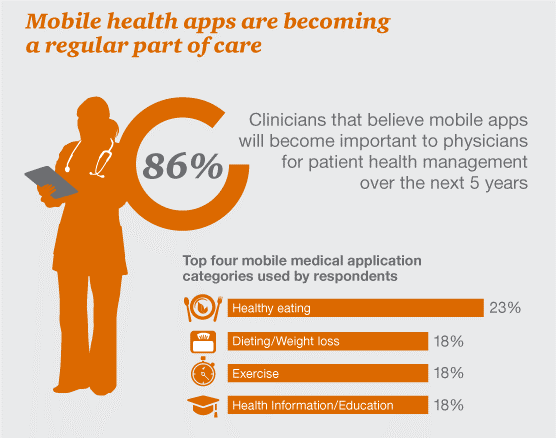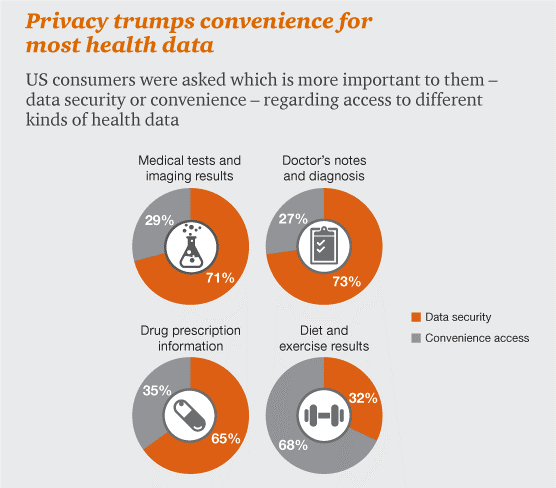Over the past few weeks flurries of publications, journalists and medical professionals have all offered their own predictions for the year ahead. Often offering wildly varying views of the next 12 months, Damian Radcliffe identifies the areas where there appears to be the most consensus.
Digital Health will have its biggest year yet in 2015, with Unity Stoakes, co-founder and president of StartUp Health, confidently stating that "digital health funding for the year is on track to double last year's total." So where are these energies going to be focused and what wider trends can we expect to see in this space this year?
1. The Wearable Evolution
As I wrote earlier in the month, 2015 is likely to herald the start of a new generation of wearable technologies. With anticipation growing about the potential impact of the Apple Watch, coupled with wearables for babies and infants, as well as a new wave of fitness trackers, this technology is set to become increasingly mainstream in the year ahead.
Writing in Mashable, Leyl Master Black also identified next generation wearables as a major digital health trend in 2015. For Black however, “your next wearable device just might be hooked around your ear.”
“Watch for increasing sophistication in ear-based devices over the coming year,” she wrote, highlighting examples such as IriverOn, BitBite, FreeWavz and SensoTRACK.
These technologies all benefit from proximity to the temporal artery, Black observes, making passive monitoring a relatively straight forward process, and a logical next step in the wearables evolution.
e-patients’ Nancy Finn also identified wearables as an area for growth, although she took a more traditional approach to the next phase of this trend.
For Finn, wearables like the Apple Watch “will explode onto the market” in the next 12 months, as part of a move towards watches which will “not only track activity and sleep, but [which] will [also] monitor pulse, heart rate, blood pressure etc.”
2. Here come the startups
Although companies like Apple and Samsung are increasingly active in this arena, they’re not the only people exploring opportunities in the digital health field.
Bernie Monegain, Editor-at-Large of Healthcare IT News, highlights that “more than 7,500 startups around the world are developing new solutions in digital health.” These entrepreneurs can be found everywhere.
“Even within the U.S., areas outside of the Bay Area, New York and Boston are [all] seeing an uptick in the number of companies obtaining funding,” she says.
2015 is the year that “startups sell into big pharma and become profitable,” argues Julie Papanek, a principal at Canaan Partners which invests in healthcare startups.
“Digital health CEOs should look at pharma as its paying customer,” Papanek suggests, acknowledging that “despite their vast differences, pharmaceutical manufacturers are starting to pay tech startups to solve their complicated problems.”
As a result, the next year will represent “a tipping point” for these types of relationships, she says.
Part of the reason for this, argues PwC, is because “manufacturers, especially drug makers, may have less experience developing and deploying digital health platforms that appeal to tech-savvy consumers.”
Subsequently “partnerships marrying product development with regulatory expertise may be best-positioned for success,” they claim. After all, “drug and device manufacturers have decades of experience working with regulators that can be useful to tech and software companies.”
3. Don’t forget the big guns
Big Pharma isn’t the only sector that might undergo a major pivot this year. 2015 could also be the year that “Amazon undercuts the medical supply chain,” Julie Papenek wrote on Techcrunch. Afterall, she says,
“Amazon sells a dizzying array of products. Catheters and surgical gloves are not on the market yet, but they will be soon. Doctors and practice managers are just like the rest of us — they love Amazon Prime for their homes, so why not for their practices?”
And she believes they’re not the only retail giant who will wade into this space.
Citing how Walmart recently launched an online healthcare insurance programme, she goes on to note how
“with a store within five miles of 95 percent of all Americans and retail transactional data from its consumers, Walmart can provided tailored population health services and incentivize healthier shopping decisions to prevent diabetes and heart disease.”
Will other major retailors follow?
4. Apps by prescription
App Stores are full of health apps, but a hot new trend for 2015, will be “prescription-only apps” proposes Leyl Master Black. As an example, she cites WellDoc's BlueStar, the first "Mobile Prescription Therapy" for people living with type 2 diabetes.
Following appropriate approvals from industry regulators, we should
"expect to see more Mobile Prescription Therapies for many major chronic diseases over the coming years," she quotes WellDoc's co-founder and chief medical officer Dr. Suzanne Sysko Clough, as saying.
To help make this a reality,
“apps can be categorized in similar ways to drugs, ranging from low-risk, over-the-counter apps to higher-risk apps that would require prescriptions,” notes PwC, in an article about the future of mHealth.
In fact, agencies are already doing this, they note, highlighting how the UK’s National Health Service maintains a public database of over 200 “safe and trusted” health apps, and that the US Food and Drug Administration (FDA) has regulated mobile apps for over a decade. However, the prefect storm of new apps and service—coupled with increased smartphone take up—means that the volume of approvals and official reviews of these products will need to rapidly increase.
Part of the reason for this is because physicians increasingly want to make use of such technologies.

Source: PwC
New apps, writes Nancy Finn, can “connect patients to physicians for real-time monitoring of heart rate, pulse, blood pressure and blood sugar, weight, body temperature, asthma, and more.”
“Most of these apps either cost under $5.00 or are free,” Finn comments, and they can be coupled with social media services which enable medical staff to monitor “their patient’s chronic care management on private, secure Facebook pages, reaching patients where they spend their time.”
In doing this, these apps can also empower end users to take more responsibility for managing chronic, lifestyle and preventative conditions.
“It's not about "disruption" in this industry,” writes Fortune’s, Laura Lorenzetti, “it’s about enhancement — and that's what you'll see more of in 2015.”
5. Privacy
New apps, wearables and entrants to the digital healthcare market may all be good for the consumer, but they also bring with them a need for increased vigilance around issues related to data privacy.
“During the summer of 2014,” PwC says, “more than five million patients had their personal data compromised in health system privacy breaches.”
And “because health records contain personal, financial and medical data,” they note, “this information is an especially attractive target to thieves, commanding up to $1,300 per record on the black market.”
Not surprisingly, these breaches can be expensive; both financially and in terms of gaining – and maintaining – consumer trust.
Digital health providers will therefore have to walk a tightrope between showing patients the benefits which can be unlocked by enhanced levels of health data, and managing their very legitimate concerns about the benefits of this personal information.
“Privacy will continue to be a sticking point,” Nancy Finn predicts, although she also hopes that “a groundswell among consumers in 2015 for better privacy protections” will encourage industry providers “to finally develop better tools” which successfully balance the twin demands of unlocking the benefits derived from massive data sets with the primacy of patient confidentiality.
Either way, privacy is an issue that everybody recognises is not going to go away. How providers juggle this with the opportunities afforded by new innovations and increased consumer expectations is going to be fascinating to observe.
 Source: PwC
Source: PwC
Damian Radcliffe is a consultant, journalist and researcher. He blogs at damianradcliffe.com and tweets @damianradcliffe.
The nuviun blog is intended to contribute to discussion and stimulate debate on important issues in global digital health. The views are solely those of the author.
Log in or register for FREE for full access to ALL site features
As a member of the nuviun community, you can benefit from:
- 24/7 unlimited access to the content library
- Full access to the company and people directories
- Unlimited discussion and commenting privileges
- Your own searchable professional profile
.jpg)

